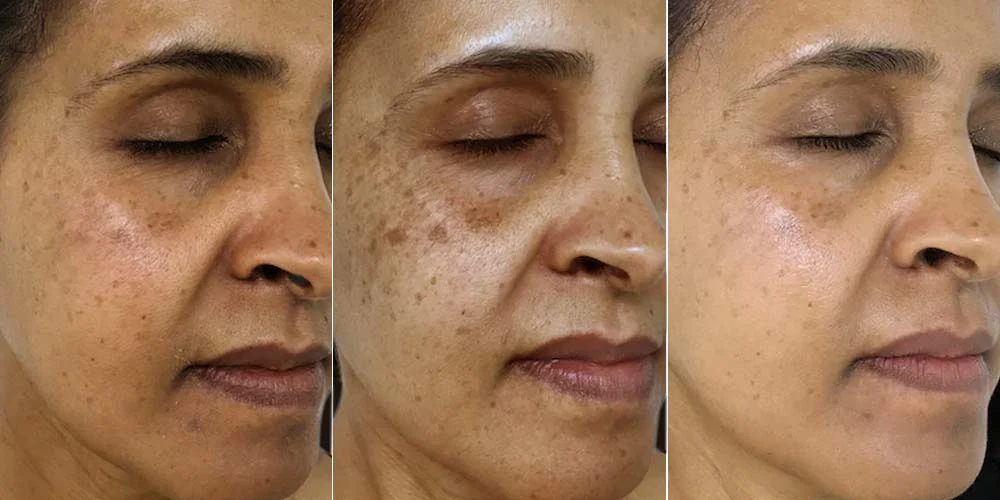Radiance Restored
Pigmentation/Dark Spots Treatment
Advanced Pigmentation/Dark Spots Treatment Treatment in Kharagpur
Overview
Pigmentation Treatment in Kharagpur | Laser Treatment
If you're struggling with dark spots, melasma, sun damage, acne marks, or uneven skin tone, the advanced laser pigmentation treatment at Zenith Aesthetics, Kharagpur offers an effective, non-invasive solution to restore clear, radiant skin.
Our dermatologists use FDA-approved Q-Switched Nd:YAG Laser technology that targets and breaks down excess melanin in the deeper layers of the skin. This helps fade stubborn pigmentation without harming the surrounding tissues. The treatment is quick, safe, and suitable for Indian skin types, especially those with Fitzpatrick skin types III–V.
Whether it’s post-inflammatory hyperpigmentation (PIH), freckles, age spots, or hormonal melasma, laser sessions at Zenith Aesthetics are customized to your skin concern and tone. Most patients see noticeable improvements in 3–6 sessions, spaced 3–4 weeks apart.
Book a personalized consultation today to discover how we can help you achieve radiant, flawless skin.

Talk to Our Experts
Pigmentation Treatment in Kharagpur | Laser Treatment
If you're struggling with dark spots, melasma, sun damage, acne marks, or uneven skin tone, the advanced laser pigmentation treatment at Zenith Aesthetics, Kharagpur offers an effective, non-invasive solution to restore clear, radiant skin.
Our dermatologists use FDA-approved Q-Switched Nd:YAG Laser technology that targets and breaks down excess melanin in the deeper layers of the skin. This helps fade stubborn pigmentation without harming the surrounding tissues. The treatment is quick, safe, and suitable for Indian skin types, especially those with Fitzpatrick skin types III–V.
Whether it’s post-inflammatory hyperpigmentation (PIH), freckles, age spots, or hormonal melasma, laser sessions at Zenith Aesthetics are customized to your skin concern and tone. Most patients see noticeable improvements in 3–6 sessions, spaced 3–4 weeks apart.
What Is Pigmentation/ Hyperpigmentation/ Dark Spots?
Pigmentation refers to the coloring of your skin caused by melanin—a natural pigment produced by cells called melanocytes. When these cells become damaged or overactive, they produce too much melanin, leading to a condition known as hyperpigmentation. This results in dark patches, spots, or uneven skin tone, most commonly on the face, neck, hands, or arms.
Hyperpigmentation can be triggered by various factors including sun exposure, hormonal imbalances, acne, skin injuries, or certain medications. It is not harmful but can affect one’s confidence and overall appearance. The most common types include:
Melasma – Usually caused by hormonal changes, often seen during pregnancy
Sunspots – Caused by UV damage from prolonged sun exposure
Post-inflammatory hyperpigmentation (PIH) – Occurs after skin trauma, acne, or burns
Dark spots, often referred to as age spots or liver spots, are small areas of hyperpigmentation that appear with age and sun exposure.
At Zenith Aesthetics, Kharagpur, we offer safe and effective solutions for pigmentation using advanced laser treatments, chemical peels, and medical-grade skincare—helping you achieve a clear, even, and radiant complexion.
What are Causes of Hyper Pigmentation/dark spots?
Hyperpigmentation or dark spots occur when the skin produces excess melanin in certain areas. Several internal and external factors can trigger this overproduction of melanin. Below are the most common causes:
1. Sun Exposure
UV radiation stimulates melanin production as a protective response, leading to sunspots or age spots, especially on exposed areas like the face and hands.
2. Hormonal Changes
Conditions like melasma are often triggered by hormonal fluctuations during pregnancy, birth control use, or hormone therapy.
3. Post-Inflammatory Hyperpigmentation (PIH)
Dark marks can develop after skin trauma such as acne, eczema, cuts, burns, or cosmetic treatments like waxing or chemical peels.
4. Certain Medications
Drugs like antibiotics, chemotherapy agents, or anti-seizure medications can cause pigmentation as a side effect.
5. Genetics
Some people are more prone to pigmentation issues due to inherited skin characteristics, especially in darker skin tones (Fitzpatrick III–V).
6. Aging
As skin ages, it becomes more vulnerable to pigment accumulation, resulting in age spots or liver spots.
7. Inflammatory Skin Conditions
Chronic skin issues like psoriasis, dermatitis, or allergic reactions can trigger localized pigmentation changes.
Types of Pigmentation
Pigmentation issues come in various forms, each with distinct causes, appearance, and treatment approaches. Here are the most common types of pigmentation:
1. Melasma
- Cause: Hormonal changes (pregnancy, birth control pills), sun exposure
- Appearance: Brown or grey-brown patches, usually on cheeks, forehead, or upper lip
- Note: Often symmetrical and persistent
2. Sunspots (Solar Lentigines)
- Cause: Long-term UV exposure
- Appearance: Flat, brown or black spots commonly found on face, neck, hands
- Note: Also known as age spots or liver spots
3. Post-Inflammatory Hyperpigmentation (PIH)
- Cause: After acne, injury, burns, eczema, or cosmetic treatments
- Appearance: Dark patches or marks that develop after the skin heals
- Note: More common in deeper skin tones
4. Freckles (Ephelides)
- Cause: Genetics and sun exposure
- Appearance: Small, flat, light brown spots that may fade in winter
- Note: Harmless but increase with sun exposure
5. Periorbital Pigmentation
- Cause: Genetics, lack of sleep, allergies
- Appearance: Dark circles around the eyes
- Note: Often difficult to treat without clinical intervention
Pigmentation Removal Treatment I How to remove dark spots on face?
Dark spots or pigmentation on the face can be frustrating and stubborn. At Zenith Aesthetics, we offer scientifically backed, dermatologist-approved treatments to effectively remove dark spots and achieve visibly brighter, even-toned skin.
1. Q-Switched Laser Treatment
- Targets deep melanin clusters
- Breaks down pigment without damaging surrounding skin
- Safe for Indian skin tones
- Visible results in 3–6 sessions
2. Chemical Peels
- Exfoliates top layers of pigmented skin
- Uses glycolic, kojic, mandelic, or yellow peels
- Suitable for melasma, tanning, acne marks
3. Medicated Skin-Lightening Creams
- Contains ingredients like hydroquinone, kojic acid, azelaic acid
- Used as part of daily skincare routine under dermatologist guidance
4. Microneedling with Serums
- Improves skin texture and pigmentation
- Boosts collagen and skin regeneration
5. Oral Antioxidants & Supplements
- Supports skin repair from within
- Glutathione, Vitamin C, and others may be prescribed
Pigmentation Treatment Procedure In kharagpur At Zenith Aesthetics
At Zenith Aesthetics, we follow a customized, dermatologist-guided approach to treat pigmentation based on the severity, type, and skin tone. Our treatments combine the best of laser technology, chemical peels, and dermatological skincare to effectively fade dark spots and even out the complexion.
Step-by-Step Procedure:
1. Skin Consultation & Analysis
A dermatologist performs a detailed skin analysis to understand the root cause of pigmentation—whether it's melasma, sunspots, or post-inflammatory hyperpigmentation. Skin type, history, and triggers are also assessed.
2. Cleansing & Pre-Treatment Prep
The skin is cleansed to remove oil, dirt, and makeup. A cooling gel or pre-treatment solution may be applied based on the selected procedure.
3. Targeted Treatment:
Laser (Q-Switched Nd:YAG) – Pulses of light energy break down melanin in deep skin layers
Chemical Peels – Application of glycolic, kojic, or lactic acid peels to exfoliate pigmented skin
Microneedling or Medifacials – For deeper pigmentation, stimulates collagen & healing
4. Post-Treatment Soothing
A calming serum and sunscreen are applied to protect and hydrate the treated area. Mild redness may occur temporarily.
5. Aftercare Advice
Sun protection, gentle skincare, and follow-up sessions are advised for long-lasting results. Most patients require 3–6 sessions for optimal improvement.
